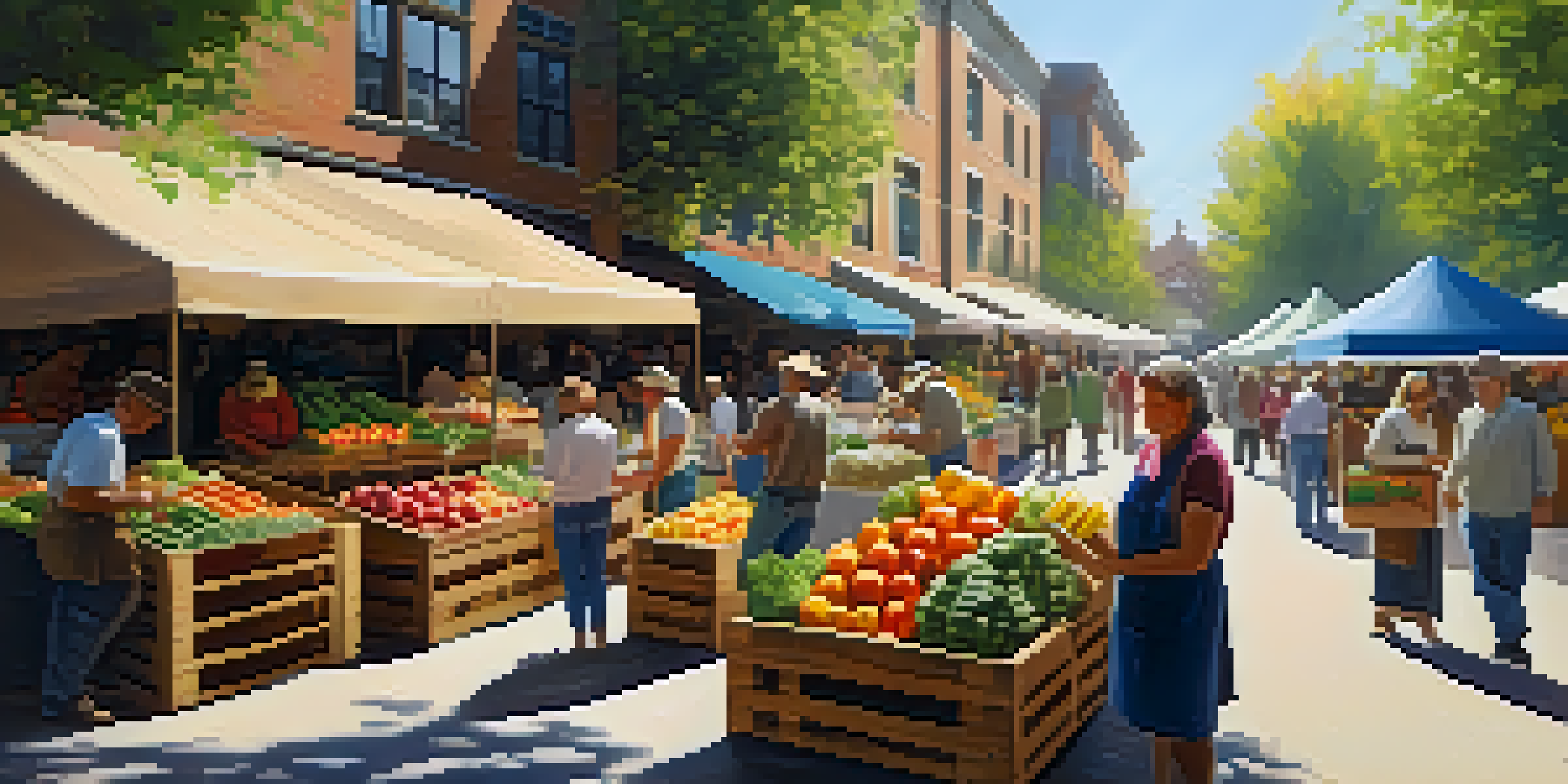Choosing Local and Organic Food to Travel Sustainably

The Importance of Sustainable Eating While Traveling
When we think about sustainable travel, food choices often take a back seat. However, what we eat on our journeys can significantly impact local economies and the environment. By choosing local and organic foods, travelers can help support farmers and reduce carbon footprints.
Sustainable eating is not just a trend; it's a responsibility we have towards our planet and our communities.
Sustainable eating isn't just about the ingredients; it's also about the practices behind them. Organic farming methods avoid harmful pesticides and promote biodiversity. This means that every bite of local produce not only tastes better but also contributes to a healthier planet.
Moreover, when you eat locally, you get to experience the culture in a more profound way. Local dishes made from fresh ingredients tell stories about the region and its people, transforming your meal into a memorable part of your travel experience.
Understanding the Benefits of Local Foods
Local foods are often fresher than their imported counterparts, which means they retain more nutrients and flavor. When you choose to eat what’s in season and grown nearby, you’re opting for meals that are vibrant and full of taste. Plus, less time in transit means less energy used in transportation.

Eating locally also supports small-scale farmers and businesses. This boosts the local economy, creating jobs and fostering community resilience. By prioritizing local foods, you're helping to preserve the unique agricultural practices that characterize a region.
Support Local Economies with Food
Choosing local and organic foods while traveling helps boost local economies and fosters community resilience.
Additionally, local foods tend to have a lower environmental impact. Since they don’t travel long distances, they contribute less to greenhouse gas emissions. This is a simple yet impactful way to make your travel footprint lighter.
The Value of Organic Foods in Travel
Organic foods are cultivated without synthetic fertilizers and pesticides, making them a healthier choice for both you and the planet. When traveling, opting for organic options can help you avoid harmful chemicals and support sustainable farming practices.
Eating locally is not just about food; it's about connecting with the land and the people who grow it.
Moreover, organic farming promotes soil health and biodiversity. This means that by choosing organic, you’re contributing to the preservation of ecosystems. It’s a win-win for both your health and the environment.
Many regions have their unique organic products, which can add a delightful twist to your culinary adventures. Trying these organic specialties can enrich your travel experience, allowing you to taste the authentic flavors of a destination while supporting ethical food production.
How to Find Local and Organic Food While Traveling
Finding local and organic foods while traveling can be easier than you think! Start by researching farmers' markets, local co-ops, and restaurants that prioritize farm-to-table practices. Many destinations now have apps or websites dedicated to connecting consumers with local food sources.
Social media can also be a great tool. Follow local food bloggers or hashtags related to your destination to discover hidden gems. Engaging with locals can provide valuable insights into where to find the best organic options.
Experience Culture Through Cuisine
Eating locally allows travelers to connect with the culture and stories behind dishes, enriching their travel experience.
Don't hesitate to ask your hotel or accommodation staff for recommendations. They often have insider knowledge about where to find the freshest local produce and can guide you to eateries that share your values.
Supporting Local Farmers and Artisans
When you choose local and organic foods, you're not just nourishing yourself; you're also supporting the people who grow and produce that food. Buying directly from farmers or artisans fosters a sense of community and strengthens local economies.
Many farmers' markets and roadside stands allow you to meet the growers and hear their stories. This connection can make your food choices feel more meaningful and enrich your travel experience. It’s about more than just a meal; it’s about building relationships.
Additionally, by supporting local producers, you contribute to sustainable practices and help protect the landscape. This means that your attention to where your food comes from can have a lasting positive impact on the environment and local cultures.
Culinary Experiences to Enhance Sustainable Travel
Engaging in culinary experiences can deepen your understanding of a region's culture. Consider taking a cooking class that focuses on local and organic ingredients. This not only helps you learn new skills but also connects you with the food community.
Food tours can also be a fantastic way to explore local cuisine while supporting sustainable practices. Many tours emphasize organic and locally sourced foods, allowing you to taste a variety of authentic dishes while learning about their origins.
Mindful Eating Reduces Waste
Practicing mindful eating can enhance your appreciation for food and minimize waste during your travels.
Moreover, participating in farm-to-table dining experiences can be a highlight of your travels. These meals often showcase seasonal ingredients, providing a true taste of the region while reinforcing your commitment to sustainable eating.
Mindful Eating: A Key to Travel Sustainability
Mindful eating is about being present and intentional with your food choices. When traveling, this means savoring each bite and considering where your food comes from. This practice can transform your dining experience and enhance your appreciation for local cuisines.
By being mindful, you can also reduce food waste. Opt for smaller portions if you’re unsure about a dish, and always finish your meal to minimize leftovers. This approach not only supports sustainability but also encourages a deeper connection to the food.

Remember, every meal is an opportunity to make a positive impact. By choosing local and organic foods, you embrace sustainability and celebrate the diverse culinary landscape of your travels.